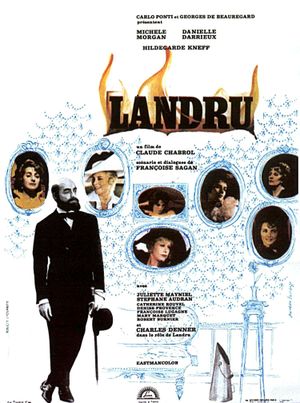Revu en Fuori Orario, cycle "Un film pas comme les autres ~ Au-delà et après la Nouvelle Vague" (partie 3).
A black comedy based on a famous french crime case, Landru uses it to expose a bourgeois (Chabrol's pet peeve) profiting from the times, played by the great Charles Denner, comfortably playing with his voice the whole film, thus making Sagan's finely crafted dialogues that much more effective, and contrasting it by the WWI backdrop often reminded to the audience.
All while offering a very good historical reconstruction up to some filmmaking elements (mixed in with the modern kit of an Hitchcock disciple).
The first two thirds, showing the criminal honing on his seduction skills and crime method, might seem repetitive to some but this element fits the angle the film takes. The last segment, Landru's trial, makes for an excellent peak.
Score: 7/10
Enjoyment: 4/5
Inspired by a famous news story, from which Chaplin had already drawn for Monsieur Verdoux, the film is a sarcastic study of crime as 'artisanal practice', opposed to the genocide on the industrial scale of war, and an homage to silent cinema silent cinema, evoked by the acting, the fixed and frontal shots and by the theatrical sets.
"Landru wallows like a fish in the water of his era. He is a perfect bourgeois: wife, children, housekeeper. He has thrown 11 women into a wood stove, but only because circumstances allowed him to do so and because it made things easier for him. [...] I don't like stories that try to diminish a myth. But is Landru a myth or a man? This question becomes crucial the moment you decide to make a film about such a character. And in my film, there are both, the man and the myth, and I think for the first time we see the metamorphosis of the former into the latter". — Claude Chabrol

